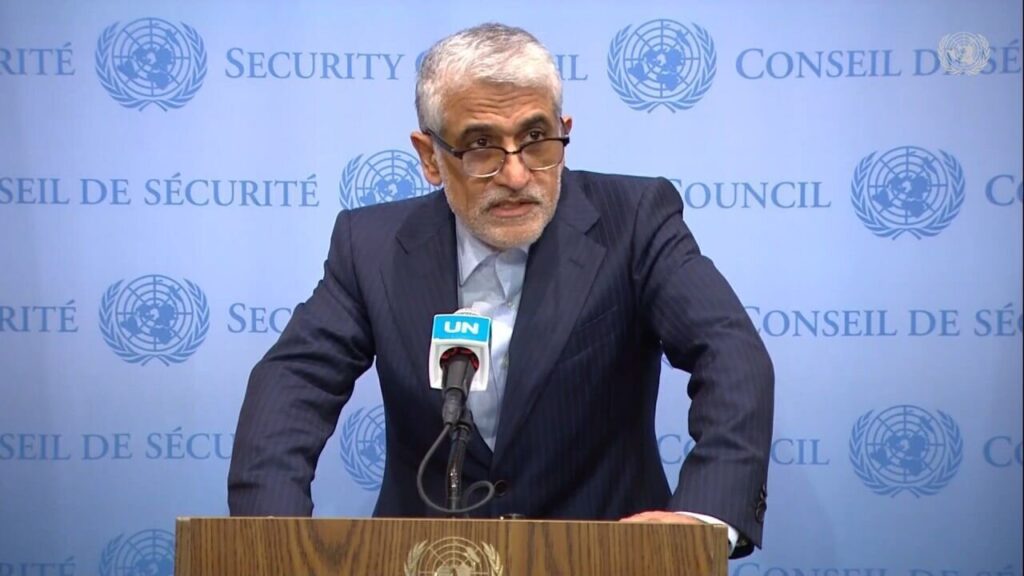Amir Saeed Iravani’s full statement is:
“According to my government, I am writing to you about a statement submitted by French Minister of Europe and Foreign Affairs Jean Noel Barrotto following the private meeting of the UN Security Council on April 28, 2025.
In his remarks, the French Foreign Minister made unfounded politically motivating claims regarding Iran’s peaceful nuclear programme, including the unfounded claim that “Iran is a sharp presence in the development of nuclear weapons.” Such claims reflect either a fundamental misconception or intentional distortion of Iran’s legal rights under international law.
It also demonstrates a selective reading of facts and exemplifies the persistent pattern of double standards by states who take certain responsibilities as permanent officers of the Security Council. In this regard, I would like to bring your attention to the following points and the attention of members of the Security Council:
The claim that Iran is a developing nuclear weapon “point” is absolutely unfounded and politically irresponsible. The Islamic Republic of Iran has never pursued nuclear weapons, and its defensive doctrine has not changed. Iran explicitly rejects all weapons of mass destruction (WMDS), including nuclear weapons. As a founding member of the treaty on the non-proliferation of nuclear weapons (NPT), Iran is fully committed to its obligations under the treaty.
The International Atomic Energy Agency (IAEA) continues to monitor and verify the peaceful nature of Iran’s nuclear program. The report consistently confirms that there was no conversion of nuclear material for non-psychological purposes.
The Joint Comprehensive Action Plan (JCPOA) was a groundbreaking multilateral achievement unanimously endorsed by the Security Council through resolution 2231 (2015). That confusion, coupled with E3’s failure to deliver the promised economic benefits, not by Iran, led to the consequences of the US’s reckless and illegal withdrawal. In response, Iran has shown strategic patience for more than a year, strictly in accordance with Articles 26 and 36 of the JCPOA before gradually reducing its commitment and halting. These measures were transparent and completely proportional.
The public threat of the French Foreign Minister to reimpose sanctions with “devastating effects” on Iran’s economy constitutes a blatant act of political and economic coercion. Relying on threats and economic intimidation is completely unacceptable, representing a clear violation of the principles enshrined in the UN Charter. Moreover, despite its own non-performance, the French threat that creates the so-called snapback mechanism is inconsistent with the fundamental principles of international law that prevent it from fulfilling its obligations and at the same time claiming consensus rights.
Such actions will be legally and procedurally flawed, acceptable, invalid, and undermine the reliability of the Security Council.
While expressing concerns about the risks of nuclear proliferation associated with Iran’s peaceful nuclear program, France’s reliability in non-proliferation is fundamentally undermined by its own record. It continues to modernize and expand nuclear weapons, refuses to extend unconditional negative security guarantees to non-nuclear-weapon states, remains silent and conspires with the Israeli regime’s undeclared nuclear weapons program.
France also has not yet met its disarmament obligation under Article VI of the Convention on the Non-Proliferation of Nuclear Weapons (NPT).
Iran’s Islamic Republic has reiterated its commitment to diplomacy and constructive engagement. However, true diplomacy cannot proceed under threat or pressure. If France and its partners are truly interested in diplomatic resolutions, they must abandon coercion and respect the state’s rights of sovereignty under international law. ”
MNA/IRN

